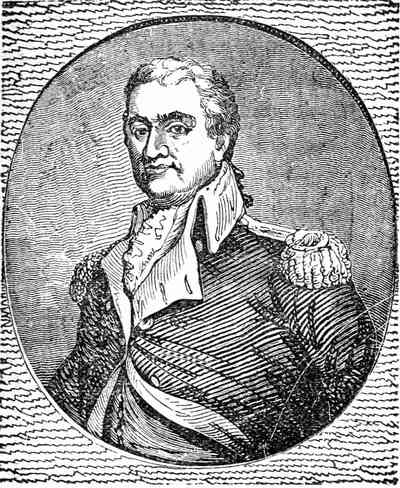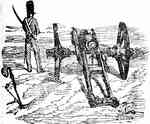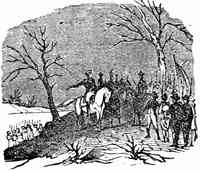Thrilling Incidents In American History
• Preface
Revolutionary War
• Opening Of The Revolution
• The Boston Massacre
• Affair of the Sloop Liberty
• Affair of the Gaspee
• The Tea Riot
• The Boston Port Bill
• The First Continental Congress-Consequent Parliamentary proceedings
• Organization of the Minute-Men
• Patrick Henry-Second Provincial Congress-First Military Enterprise
• Battles of Lexington and Concord
• Battle of Bunker's Hill
• Capture of Ticonderoga
• Second Continental Congress-Washington's Appointment
• Siege of Boston
• Incidents at the Evacuation of Boston
• Burning of Falmouth
• Arnold's Expedition to Quebec
• Siege of Quebec, and Death of Montgomery
• Scenes at Quebec during the Siege
• Expedition against Charleston
• The Declaration of Independence
• The Battle of Long Island
• Washington's Retreat through New Jersey-Capture of General Lee
• Battle of Trenton
• Battle of Princeton
• Capture of General Prescott
• Battle of Brandywine
• Battle of Germantown
• Battle of Red-Bank
• Attack on Fort Mifflin-Retirement of the Army to Valley Forge
• Battle of Bennington
• Murder of Miss M'Crea
• Battle of Stillwater
• Battle of Bemis' Heights, and Retreat of Burgoyne
• Capture of Forts Clinton and Montgomery
• Surrender of Burgoyne
• The Treaty with France
• Attack on Savannah, and Death of Pulaski
• Storming of Stony Point
• General Sullivan's Campaign against the Mohawks
• Tarleton's Quarters
• Battle of Camden, and Death of De Kalb
• Arnold's Treason
• The Loss of the Randolph
• The British Prison-Ships
• Capture of the Serapis
• Putnam's Feat at Horseneck
• Battle of Eutaw Springs
• Wayne's Charge at Green Spring
• Capture of the General Monk
• The Mutinies
• Battle of the Cowpens
• Capture of New London
• Massacre of Wyoming
• Surrender of Cornwallis
War With France
• Capture of L'Insurgente
• The Constellation and Vengeance
War With Tripoli
• Burning of the Philadelphia
• Bombardment of Tripoli
• Loss of the Intrepid
• Expedition of General Eaton
Second War With England
• Battle of Tippecanoe
• Capture of the Guerriere
• Tragical Affair of an Indian Chief
• Battle and Massacre at the River Raisin
• Captain Holmes's Expedition
• Capture of the Caledonia and Detroit
• The Wasp and Frolic
• Gallant Conduct of Lieutenant Allen at the Capture of the Macedonian
• Capture and Destruction of the Java
• Siege of Fort Meigs
• Capture of York, and Death of General Pike
• Defence of Sackett's Harbour
• Defence of Fort Stephenson
• Battle of Lake Erie
• Battle of the Thames
• Gallant Action of Commodore Chauncey under the guns of Kingston Citadel
• The Sacking of Hampton
• Capture of the Peacock
• Massacre at Fort Mimms
• Surrender of Weatherford
• Battle of Niagara
• BattIe of New Orleans
War With Mexico
• Battle of Palo Alto
• Battle of Resaca de la Palma
• Capture of Monterey
• Battle in the Streets of Monterey
• Thrilling Scenes in the Battle of Buena Vista
• Bombardment of Vera Cruz
• Battle of Cerro Gordo
• Battles of Contreras and Churubusco
• Storming of Chapultepec


General Knox
BATTLE OF TRENTON.
 IN that alarming state of affairs which presented itself in
the winter of
1776, the American leaders still maintained an erect posture, and their brave
and persevering commander-in-chief did not despair. Congress actively
employed all the means in their power for supporting their independence, and
General Washington applied in every quarter for
reinforcements. He perceived the security of the British commander-in-chief and
the advantages which the scattered cantonment of his troops presented to the
American arms. "Now," exclaimed he, on being informed of the widely dispersed
state of the British troops, "is the time to clip their wings, when they are so
spread;" and, accordingly, he resolved to make a bold effort to check the
progress of the enemy. For that purpose he planned an attack on the Hessians at
Trenton. General Putnam, who was stationed in Philadelphia, might have been
useful in creating a diversion on that side; but in that city the disaffection
to Congress was so great, and the friends of Britain so strong, that it was
deemed inexpedient to withdraw, even for a short time, the troops posted there.
But a small party of militia, under Colonel Griffin, passed the Delaware near
Philadelphia, and advanced to Mount Holly. Count Donop marched against them,
but, on their retreat, he returned to Bordentown.
IN that alarming state of affairs which presented itself in
the winter of
1776, the American leaders still maintained an erect posture, and their brave
and persevering commander-in-chief did not despair. Congress actively
employed all the means in their power for supporting their independence, and
General Washington applied in every quarter for
reinforcements. He perceived the security of the British commander-in-chief and
the advantages which the scattered cantonment of his troops presented to the
American arms. "Now," exclaimed he, on being informed of the widely dispersed
state of the British troops, "is the time to clip their wings, when they are so
spread;" and, accordingly, he resolved to make a bold effort to check the
progress of the enemy. For that purpose he planned an attack on the Hessians at
Trenton. General Putnam, who was stationed in Philadelphia, might have been
useful in creating a diversion on that side; but in that city the disaffection
to Congress was so great, and the friends of Britain so strong, that it was
deemed inexpedient to withdraw, even for a short time, the troops posted there.
But a small party of militia, under Colonel Griffin, passed the Delaware near
Philadelphia, and advanced to Mount Holly. Count Donop marched against them,
but, on their retreat, he returned to Bordentown.
General Washington formed his troops into three divisions, which were almost simultaneously to pass the Delaware, at three different places, on the evening of the 25th of December, hoping to surprise the enemy after the festivities of Christmas. One division, under General Cadwalader, was to pass the river in the vicinity of Bristol, but failed through inattention to the state of the tide and of the river, as they could not land on account of the heaps of ice accumulated on the Jersey bank. The second division, under General Irving, was to pass at Trenton ferry, hut was unable to make its way through the ice. The third and main division, nnder the command of General Washington in person, assisted by Generals Sullivan and Greene, and Colonel Knox of the artillery, accomplished the passage, with great difficulty, at M'Konkey's ferry, about nine miles above Trenton. The general had expected to have his troops on the Jersey side about midnight, and to reach Trenton about five in the morning. But the difficulties arising from the accumulation of ice in the river were so great, that it was three o'clock in the morning before the troops got across, and nearly four before they began to move forwards. They were formed into two divisions, one of which proceeded towards Trenton by the lower or river road, and the other by the upper or Pennington road.
Colonel Rhalle had received some intimatIon that an attack on his post was meditated, and probably would be made on the evening of the 25th. Captain Washington, afterwards much distinguished as an officer of cavalry, had for some days been on a scouting party in the Jerseys with about fifty foot soldiers; and, ignorant of the meditated attack on the evening of the 25th, had approached Trenton, exchanged a few shots with the advanced sentinels, and then retreated. The Hessians concluded that this was the threatened attack, and became quite secure. Captain Washington, in his retreat, met the general advancing against Trenton by the upper road, and joined him. Although some apprehensions were entertained that the alarm excited by Captain Washington's appearance might have put the Hessians on their guard; yet, as there was now no room either for hesitation or delay, the Americans steadi]y continued their march. The night was severe, it sleeted, snowed, and was intensely cold, and the road slippery. But General Washington advanced firmly, and at eight o'olock in the morning reached the Hessian advanced posts, which he instantly drove in; and, so equal had been the progress of the columns, that in three minutes afterwards the firing on the river road announced the arrival of the other division.
Colonel Rhalle, who was a courageous officer, soon had his men under arms, and prepared for a brave defence; hut, early in the engagement, he received a mortal wound, and his men being severely galled by the American artillery, about one thousand of them threw down their arms and surrendered themselves prisoners of war; but a considerable body of them, chiefly light horse, retreated towards Bordentown and made their escape.
In this attack not many Hessians were killed, and the Americans lost only four or five men, some of whom were frozen to death by the intense cold of the night. Some of General Washington's officers wished him to follow up his success, and he was much inclined to pursue that course; but a council of war was averse from the measure, and he did not think it advisable to act contrary to the prevailing opinion. On the evening of the 26th he repassed the Delaware, carrying his prisoners along with him, and their arms, colours, and artil1ery.
This enterprise, although it failed in several of its parts, was completely successful in so far as it was under the immediate direction of the commander-in-chief, and it had a happy effect on the affairs of America. It was the first wave of the returning tide. It filled the British with astonishment; and the Hessians, whose name had before inspired the people with fear, ceased to be terrible. The prisoners were paraded through the streets of Philadelphia to prove the reality of the victory, which the friends of the British government had denied. The hopes of the Americans were revived, and their spirits elevated; they had a clear proof that their enemies were not invincible, and that union, courage, and perseverance. would insure success.
